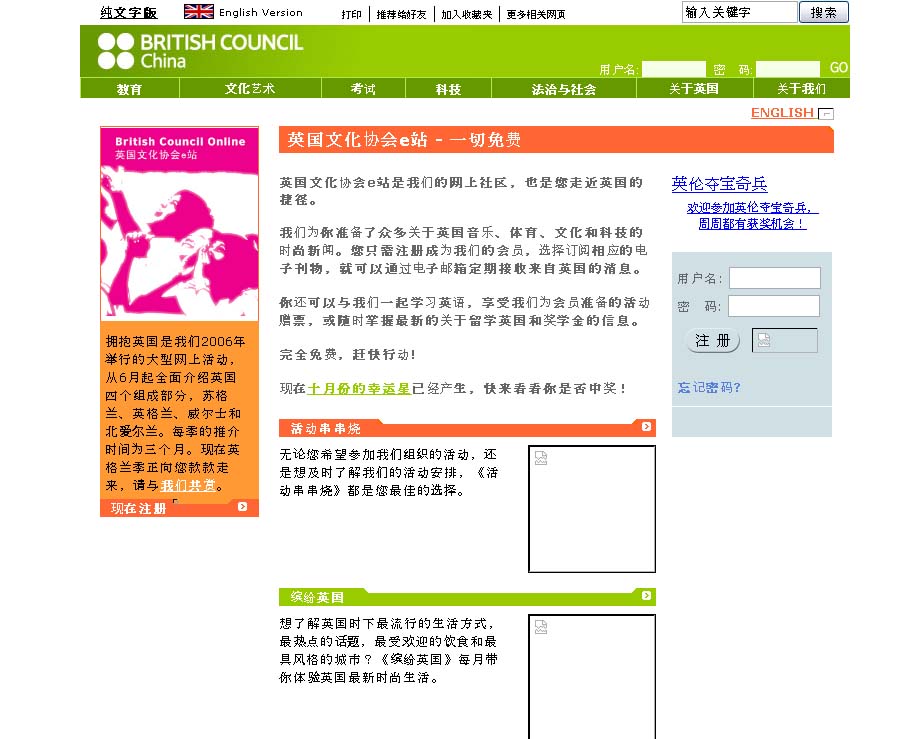While the vast majority of content in the UK Government Web Archive is presented in English and Welsh, there is a substantial amount in other languages. This post offers a brief introduction to the variety of other language content in the collection. As yesterday was The European Day of Languages, this post seems quite timely.
Presenting content in multiple languages means that content creators can engage with both wider and more specific audiences. The necessity to produce such content online is as varied as in non-digital formats. The aims can range from improved community engagement through dissemination of information to celebrations of the diversity of cultures in the UK; from fire safety advice to recruiting intelligence officers.

British Council website from 2006, in Chinese
From this brief analysis of the types of content produced in different languages, here are some significant categories, with examples:
- National citizen-facing content, which aims at educating or informing the public. For example, this Fire Safety in the Home Leaflet, from 2010, in Bengali.
- International business-facing content, to promote the UK to countries that it could trade with, from 2009, in Japanese.
- Informative and promotional content for vistors to the UK, as seen here, taken from 2007, in Arabic.
- Intelligence and defence related communications, in Spanish, as with this example from 2007.
- Encouraging International collaboration on cultural and economic matters, such as with this, in Chinese.
- Immigration and visa advice, from the UK in Iran website, in Farsi.
- Events in other countries that directly involve the UK or UK nationals. For example, the website for the Scott Baker Inquests into the deaths of Diana, Princess of Wales and Emad El-Din Mohamed Abdel Moneim Fayed (Mr Dodi Al Fayed), in France, had both English and French versions.
Within our collection, you can see that other languages are not the sole preserve of government information, publications or campaigns. They are also delivered verbally.
There is former Prime Minister Tony Blair’s congratulations to the newly-elected President of France, Nicolas Sarkozy, in 2007 (the video of which will shortly be available from the web archive). And more recently, the Deputy Prime Minister Nick Clegg spoke in Spanish when he addressed the Mexican Senate.
The UK Government Web Archive holds the historical record of what the UK central government has said online. Some very interesting analysis and research could be carried out on the content from a whole range of perspectives.
Cisco, thank you for your comments and I am glad you found this interesting.
Best wishes,
Tom
Where can I find the corrupt Judge, Scott Baker Inquest documents into Princess Diana´s assassination ?
Best Regards from Oslo, Norway
Where can I find the Inquest transcripts on Princess Diana ? We all know that a cover-up has taken place in the form of a deeply flawed police and judicial investigation in France and Britain, culminating in a corrupt Inquest conducted in the UK.
Princess Diana´s treatment in the SAMU ambulance reveals there was a clear intention to completely eliminate Diana, Diana survived the crash itself, but died as a result of her deliberate mistreatment in the ambulance, by Drs. Arnoud Derossi and Jean Marc Martino.
The assassination was carried out on a Multi – governmental level, this means that justice can only be found through a thorough and independent investigation by an international tribunal – such as the international court of justice – with the power to summon witnesses from the UK, US and France.
Where can I find the Diana transcripts ?
Inquest transcripts are available in the Web Archive: http://webarchive.nationalarchives.gov.uk/20090607230252/http:/www.scottbaker-inquests.gov.uk/hearing_transcripts/index.htm
If you have further research queries, please send them via the contact form on the main website.
Many thanks,